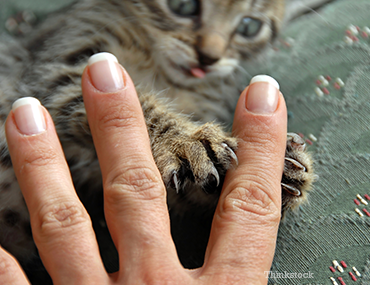Anyone who’s watched their cat go through a bout of vomiting or a case of the sniffles has probably wondered: Can I get sick from my cat? Is what my cat has contagious?
The answer is yes. There are actually a number of diseases you can contract catch from your cat, known broadly as zoonotic diseases. The word “zoonotic” is used to describe any disease that is transmittable from animals to humans. The best known and most feared example of a zoonotic disease is rabies. Other common zoonotic diseases in cats include:
- Toxoplasmosis
- Ringworm
- Salmonellosis
- Campylobacter infection
- Giardia
- Cryptosporidium infection
- Roundworms
- Hookworms
- Cat Scratch Disease
Yikes! Is my cat really that risky? Now for the good news: although it’s possible to catch a zoonotic disease that’s been bothering your kitty, it’s not likely. That being said, your chance of contracting a zoonotic illness does increase if you have a compromised immune system due to a pre-existing disease or medical condition. Examples include:
Now for the good news: although it’s possible to catch a zoonotic disease that’s been bothering your kitty, it’s not likely. That being said, your chance of contracting a zoonotic illness does increase if you have a compromised immune system due to a pre-existing disease or medical condition. Examples include:
- Persons infected with HIV or suffering from AIDS
- Pregnant women
- Patients being treated with chemotherapy or radiation therapy
- Elderly people
- People with chronic diseases or congenital immune system deficiency
- People who have received organ/bone marrow transplants
If I’m at a higher risk, should I give my cat away?
No! It just means that you need to be extra cautious around your pet:
- Remember your veterinarian and your physician are your best sources of information regarding zoonotic disease.
- Keep your kitty strictly indoors! This is the best way to prevent your cat from being infected with a zoonotic disease
- Follow your veterinarian’s recommendations regarding vaccination, parasite testing, treatment and prevention.
Since many of the diseases on the above list are transmitted through contact with your cat’s feces, several measures can be taken to ensure that you remain safe, and most involve simple hygiene and common sense. In all instances, you want to avoid coming into direct contact with your cat’s feces. Here are some suggestions to keep yourself safe:
- Keep your cat’s litter box away from the kitchen or other areas where you prepare or store food.
- It might not always be possible, but ask someone who is not at significant risk for zoonotic diseases to take on litter box cleaning duty. Also, have the litter box cleaned daily. The organism that causes Toxoplasmosis, for example, takes 24 hours to become infectious.
- Use disposable litter box liners and change them each time you clean the litter box.
- Don’t dump litter. If you do, you could put yourself at risk of inhaling an infectious agent. Either pour the litter slowly into the trash or wrap the litter box liner tightly and securely.
- It is ideal to clean the litter box thoroughly at least twice per month. Use hot water, and soak the litter box for several minutes. This will kill organisms like Toxoplasmosis.
- Always wear disposable gloves when cleaning the litter box, and toss them after each wash
In addition, it is very important that you monitor your cat regularly for any signs of illness or disease and wash your hands after direct contact with your cat. And remember: if you are worried about the possibility of contracting a zoonotic disease from your pet, your best resource for information is your veterinarian.
If you have any questions or concerns, you should always visit or call your veterinarian – they are your best resource to ensure the health and well-being of your pets.

